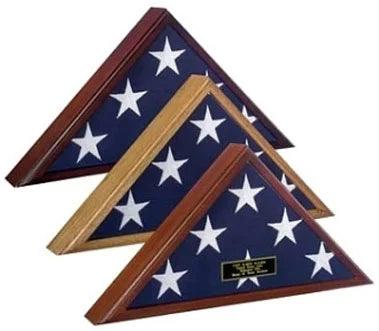Introduction:
Casket flag cases stand as solemn sentinels at military funerals, embodying the weight of sacrifice and service. These cases, often draped with the American flag, hold profound significance, representing the bravery and dedication of those who have served in the armed forces. In this article, we'll explore the deeper meanings behind casket flag cases, shedding light on their historical context, ceremonial role, and symbolic importance.
Honoring Service and Sacrifice:
At the heart of every casket flag case lies a poignant tribute to the men and women who have selflessly served their country. The flag, carefully folded and encased, serves as a tangible symbol of their sacrifice and commitment. For families and loved ones, the presentation of the flag in a casket case represents a solemn acknowledgment of their loved one's service, honoring their legacy with dignity and respect.
Historical Roots:
The tradition of presenting flags to honor fallen soldiers dates back centuries, with roots deeply embedded in military history. During the American Civil War, soldiers were laid to rest with flags draped over their caskets, symbolizing their allegiance and valor on the battlefield. Over time, this practice evolved into the formal presentation of the flag to the next of kin, accompanied by the ceremonial folding and encasement in a casket flag case.
Ceremonial Significance:
The presentation of the flag in a casket flag case is a deeply ceremonial moment, steeped in tradition and protocol. Each fold of the flag holds symbolic meaning, representing principles such as honor, sacrifice, and patriotism. The meticulous folding process, conducted with precision and reverence, pays homage to the service member's dedication to duty and country. When the flag is presented to the bereaved family, it is a solemn gesture of gratitude and remembrance, acknowledging the sacrifices made in defense of freedom.
Symbolic Importance:
Beyond its ceremonial role, the casket flag case serves as a powerful symbol of national unity and collective mourning. It represents the enduring legacy of those who have served and sacrificed for the greater good, reminding us of the freedoms we hold dear and the price paid to secure them. Whether displayed in a military funeral or a memorial service, the flag case serves as a focal point of reverence, inspiring reflection and gratitude for the sacrifices made by our service members.
Conclusion:
In conclusion, casket flag cases are more than mere containers for flags—they are symbols of sacrifice, service, and honor. Through their ceremonial presentation and historical significance, they pay tribute to the bravery and dedication of those who have answered the call of duty. As we honor the memory of our fallen heroes, may we never forget the profound symbolism embodied in each casket flag case, and the debt of gratitude we owe to those who have given their all for our nation.
For more burial flag cases, Click Here!
For more flag and medal display cases, Click Here!

